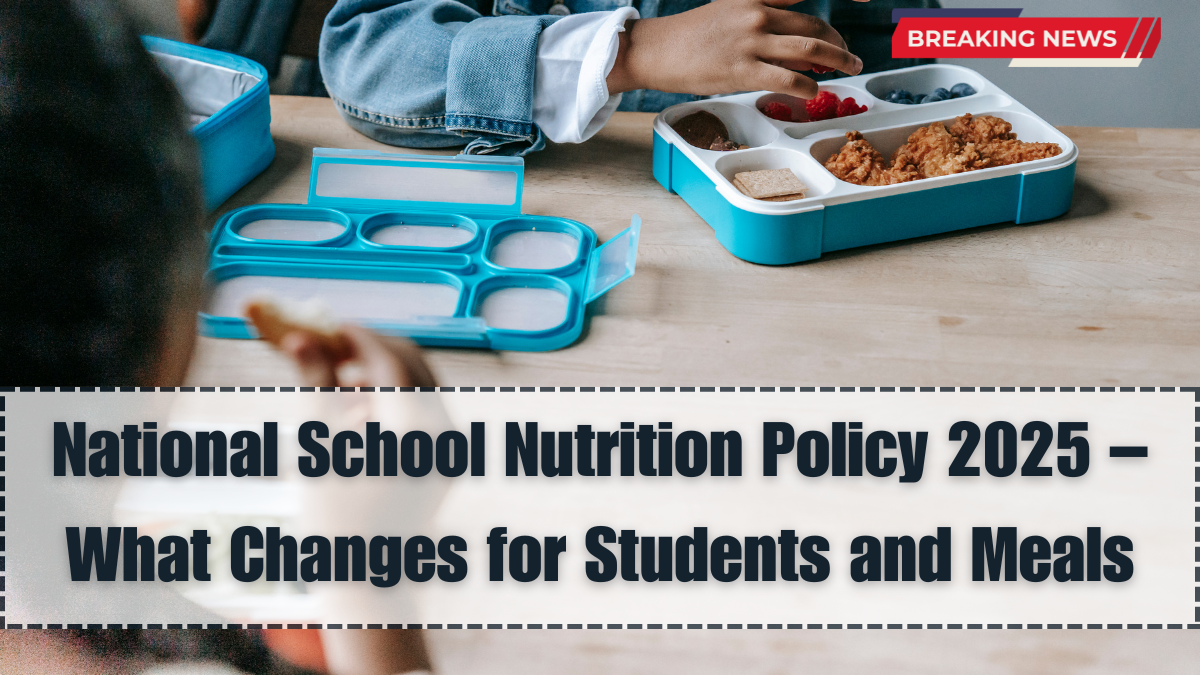The Government of India has officially launched the National School Nutrition Policy 2025, revising the existing standards for meals served in schools across the country. This major policy overhaul ensures that every student receives nutritious, hygienic, and well-balanced meals through the midday meal scheme. The initiative places a strong focus on health, immunity, and physical growth.
With the increasing concerns around child malnutrition and learning outcomes, the National School Nutrition Policy 2025 is now being implemented in all government and aided schools under the guidance of the Ministry of Education and Ministry of Health. The program integrates updated food safety standards and adds new components to the daily school meal.

Key Highlights of the Nutrition Policy
The revised National School Nutrition Policy 2025 introduces a structured and standardized nutrition framework:
-
Daily calorie and protein guidelines based on age and activity
-
Inclusion of local seasonal vegetables and grains
-
Mandatory hygiene checks and food safety audits
-
Weekly inclusion of iron and folic acid-rich food
-
One serving of fruits or milk at least thrice a week
-
Cooking with fortified oils and iodized salt
This new education policy encourages active monitoring of meals, with greater accountability from school heads and kitchen staff.
Updated Nutritional Standards by Age Group
The National School Nutrition Policy 2025 has laid out specific nutritional requirements for different age groups:
| Age Group | Daily Calories | Daily Protein | Add-ons |
|---|---|---|---|
| 6–10 yrs | 450 kcal | 12g | Fortified rice + veg curry |
| 11–15 yrs | 700 kcal | 20g | Dal, chapati, seasonal veg |
| 16+ yrs | 900 kcal | 25g | Eggs/Milk, greens, rice/chapati |
All meal components are monitored under the midday meal plan, ensuring consistency and balanced nutrition.
Role of Schools in Nutrition Delivery
The implementation of the National School Nutrition Policy 2025 is school-led and community-supported. Key responsibilities include:
-
Appointing nutrition coordinators in every school
-
Ensuring meal preparation areas meet hygiene norms
-
Conducting weekly reviews with School Management Committees (SMCs)
-
Reporting daily meal data via digital portals
-
Promoting nutrition India awareness through morning assemblies
This ensures that students not only receive healthy food but also understand the importance of a nutritious diet.
Impact of the Policy on Students
The National School Nutrition Policy 2025 aims to transform how students eat and learn. Its positive effects include:
-
Reduced classroom hunger and increased attention span
-
Better growth indicators among students aged 6–16
-
Boost in school attendance and retention rates
-
Improved immunity and reduced health complaints
-
Positive behavioral changes and mood improvement
By integrating meals with learning, the school nutrition program supports both physical and mental development.
FAQs
What is the National School Nutrition Policy 2025?
National School Nutrition Policy 2025 is a government-approved framework that revises the nutritional standards for meals served in schools to promote child health and academic performance.
Which schools follow this policy?
All government, government-aided, and CBSE-affiliated schools serving midday meals are required to implement the National School Nutrition Policy 2025.
What’s new in the meal program?
The updated policy includes age-specific calorie goals, fortified foods, fruit/milk servings, and stronger hygiene protocols under the nutrition India mission.
Who monitors the meal quality?
School principals, nutrition coordinators, and the School Management Committee (SMC) are responsible for monitoring and reporting under the midday meal program.
Are private schools part of this policy?
While not mandatory for private schools, many are voluntarily adopting parts of the National School Nutrition Policy 2025 to promote better student health.
Click here to know more.
